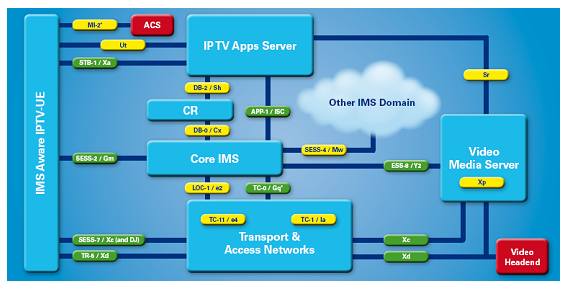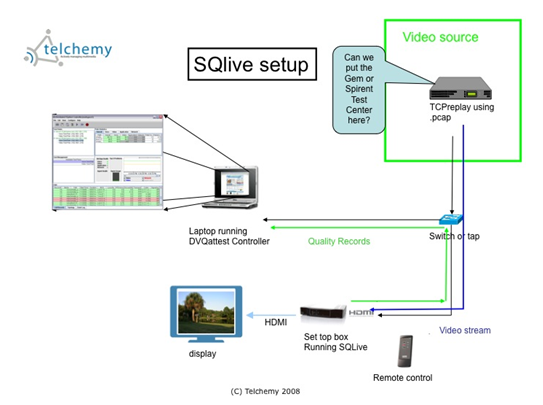
August 13, 2009
Management Is Key to Better IPTV By TMCnet Special Guest The latest broadband and IPTV statistics suggest continuing impressive growth in the face of the global economic downturn. But how much are these results simply aligned with the spread of broadband, and users’ initial desire to make the most of the new service? Will they return to other TV services or will they remain long-term customers for IPTV? For all the good statistics, there are also some less optimistic forecasters suggesting that IPTV growth is not so resilient.
If there is any doubt about the prospects for IPTV then it is no time to be complacent, and the future must depend upon a number of factors including pricing, content and quality of experience. In particular, if IPTV fails to deliver QoE matching or better than other TV technologies, it risks being seen as a novelty – something for first-time broadband customers to play with, rather than a serious access medium for quality TV.
GMI 2008 – the MultiService Forum’s (News - Alert) biennial global interoperability event –featured a groundbreaking collaboration between the MSF and Alliance for Telecommunications Industry Solutions IPTV Interoperability Forum. IPTV was a particularly high profile element of GMI 2008, and the IIF is recognized globally as the leading developer of IPTV requirements, standards, and specifications.
Among the findings of this work was the vital role of network management – as contrasted with best-effort networking – in providing customers with a superior user experience for IPTV services. Management supports a customer’s quality of experience by supporting quality of service for IPTV and by providing a set of easy to use mechanisms to control the IPTV delivery.
This paper presents a brief summary of the main findings of GMI2008 relevant to the IPTV management issue.
GMI 2008 – some background
The MultiService Forum is a global association of service providers, system suppliers and test equipment vendors committed to developing and promoting open-architecture Next Generation Networks (News - Alert). The MSF’s activities include developing Implementation Agreements, promoting worldwide compatibility and interoperability of network elements, and encouraging input to appropriate national and international standards bodies. In particular the MSF is known for its GMI (Global MSF Interoperability) events.
GMI 2008 was the latest event organized by the MSF to provide a worldwide multi-vendor interoperability test environment for end-to-end practical network deployment. The two-week final test event, held in October 2008, involved inter-networked lab sites in the United States, United Kingdom and China – provided by Verizon, National Communications System, University of New Hampshire Interoperability Lab, China Mobile and BT/Vodafone (News - Alert). It involved 22 vendors, 125 registered test engineers at host sites working round the clock to put 225 devices through a total of around 500 test combinations.
Six scenarios were addressed:
These six physical scenarios incorporated a total of 87 basic test cases, with over 400 related sub-test cases adding up to around 500 in all. 38 of these test cases were designed specifically designed to test the capability and robustness of IPTV solutions and results from scenarios 2, 3 and 6 were particularly relevant to the delivery of IPTV services with good QoE.
Scenario 2 measured the ability to maintain end-to-end QoS session requests in the access and core networks for audio and video sessions and for both intra- and inter-IMS calls. They also were designed to demonstrate session modification resulting in changes to existing end-to-end QoS resources.
IPTV testing at GMI2008
Scenario 3a – IMS IPTV tested a range of IMS-based IPTV services, including linear / broadcast TV, Video on Demand, and network-based Personal Video Recorder, and interoperability scenarios. S3a also demonstrated the session initiation and bandwidth reservation capabilities of IMS, the program guide and service control capability of the “Service Selection Function and Apps-Server” (modules within IPTV Apps Server), and the high quality video transmission capability between IMS-IPTV user equipment and MDF (a part of the Video Media Server) or head ends. The scenario included both M1 and M2 variants of the mechanism by which the Real Time Streaming Protocol channel and the associated media channel is negotiated. The MSF IAs are shown in green in the following diagram:
 This, the first ever test of IMS-based IPTV validated the promise of IMS for TV and TV-based enhanced multimedia services. It demonstrate that the unified user and service profile in IMS can support personalized, portable, and secure multimedia services, with the Set Top Box successfully selecting services and providing service provider discovery. The user was able to receive broadcast programs, select channels, start / stop watching, change channels, pause, and rewind programs via the STB. Other services successfully demonstrated were Video on Demand and the use of a PVR to initiate and terminate recordings at the user’s request. Also demonstrated was the ability to measure the user experience over an IMS network that supports QoS versus best effort.
For Scenario 3b the MSF partnered with the ATIS IIF to test protocols to be used for scaleable IPTV deployment. With a well-structured architecture, implementing a service is a relatively easy series of clearly defined tasks – so a key GMI 2008 objective was to test key protocols at the heart of the IIF IPTV architecture. Several IPTV deliverables have already been published by ATIS – including: IPTV architecture requirements and roadmap; a framework for QoS metrics and measurements; packet loss and remote management. A further 19 standards and specifications are under development and quickly maturing, so ATIS concluded it was important to test these standards as soon as possible to ensure they met service provider requirements in a live network environment.
MSF and ATIS selected three key areas for testing. The first was “network attachment and initialization” – ie the user’s experience of buying and installing a set top box, and connecting to chosen IPTV services. The second was QoE (quality of experience), in particular how to correlate QoS measurements from test equipment against quality as perceived by the end user (QoE), so that test equipment vendors can follow standard procedures without ambiguity.
 The third area was Remote Management of the STB (Set Top Box) – including configuration, remote diagnostics, and performance management without sending out a field engineer. This tested the service provider’s ability to monitor QoS and QoE parameters and take action before subscribers had reason to complain.
The test scenario affirmed that the basic registration and initialization mechanisms passed proof of concept and the QoS metrics correlated usefully with the end users’ QoE.
Management testing
Scenario 6 tested network operators’ ability to enable data collection points within the IMS core and IP network to gather network performance data to monitor and optimize the performance of the IMS network. It tested support for the 3GPP-defined Charging Collection Function by defining a Offline Charging Server to collect Charging data for IMS calls and generate Call Data Records for billing purposes. Also tested was support for an Auto Configuration Server to configure and manage STBs installed in customer premises over the TR-069 interface.
The test results reflected the increasing maturity of IMS cores and related control protocols, although ease of network element configuration options in a multi-vendor network solution remains a challenge. Once these configuration issues were resolved the network elements proved able to generate and collect the performance data.
Conclusions
GMI 2008 confirmed the maturity of the IMS protocols. Calls were successfully established across all access types and between most combination pairs and roaming worked well. The overall architecture, however, proved complex and required significant local configuration. Highlighting such difficulties proves the validity of the MSF approach to developing IAs as an aid to achieving multi-vendor interoperability.
Testing early implementations of key IPTV standards in a realistic network provided early validation of the base protocols and an opportunity to identify areas for optimization. The insight from these tests is being fed back into ATIS IIF and the standards are being updated as a result. Performance management testing added another dimension that will become increasingly important as the base interoperability becomes widely available.
Providing a superior user experience relative to best effort Internet services, means paying attention to QoS, network and application management, and security. These were important in GMI 2008, and the results are already feeding back into the development cycle.
Working with standards bodies to shorten the standards development cycle is also key to delivering services promptly. Following successful partnership with ATIS, the MSF will be working with ETSI (News - Alert) in France in Q4 this year, and will continue to pursue a co-operative approach to reduce duplication of effort and make best use of shared expertise and resources.
The MSF is driven by sensitivity to industry’s real needs – not just delivering test results but responding to their implications. By evolution, the MSF continues to provide increasing value to its members.
Follow ITEXPO on Twitter: twitter.com/itexpo TMCnet publishes expert commentary on various telecommunications, IT, call center, CRM and other technology-related topics. Are you an expert in one of these fields, and interested in having your perspective published on a site that gets several million unique visitors each month? Get in touch. Edited by Michael Dinan (source: http://satellite.tmcnet.com/topics/satellite/articles/62046-management-key-better-iptv.htm) |





